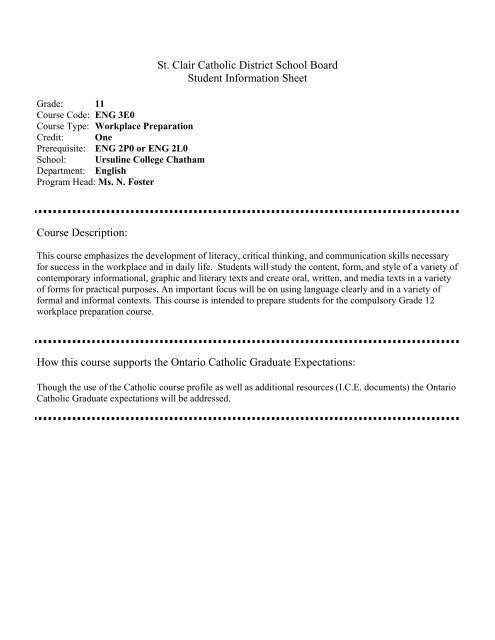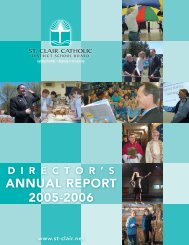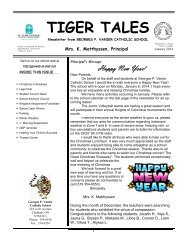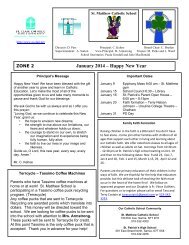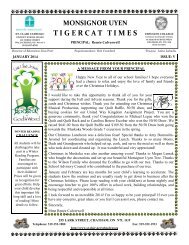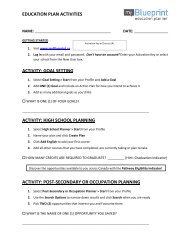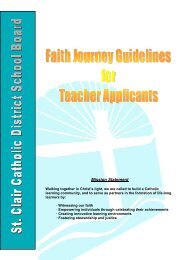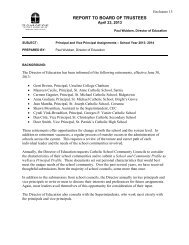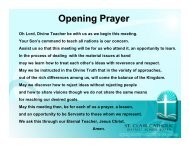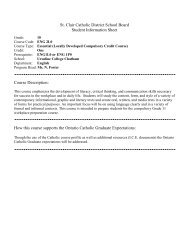ENG3EO - St Clair CDS Board
ENG3EO - St Clair CDS Board
ENG3EO - St Clair CDS Board
Create successful ePaper yourself
Turn your PDF publications into a flip-book with our unique Google optimized e-Paper software.
Grade: 11<br />
Course Code: ENG 3E0<br />
Course Type: Workplace Preparation<br />
Credit: One<br />
Prerequisite: ENG 2P0 or ENG 2L0<br />
School: Ursuline College Chatham<br />
Department: English<br />
Program Head: Ms. N. Foster<br />
<strong>St</strong>. <strong>Clair</strong> Catholic District School <strong>Board</strong><br />
<strong>St</strong>udent Information Sheet<br />
Course Description:<br />
This course emphasizes the development of literacy, critical thinking, and communication skills necessary<br />
for success in the workplace and in daily life. <strong>St</strong>udents will study the content, form, and style of a variety of<br />
contemporary informational, graphic and literary texts and create oral, written, and media texts in a variety<br />
of forms for practical purposes. An important focus will be on using language clearly and in a variety of<br />
formal and informal contexts. This course is intended to prepare students for the compulsory Grade 12<br />
workplace preparation course.<br />
How this course supports the Ontario Catholic Graduate Expectations:<br />
Though the use of the Catholic course profile as well as additional resources (I.C.E. documents) the Ontario<br />
Catholic Graduate expectations will be addressed.
1. Overall Expectations for <strong>St</strong>udent Learning:<br />
Through this course, students will be expected to demonstrate knowledge, skills and values related to<br />
the following strands:<br />
<strong>St</strong>rand: Literature <strong>St</strong>udies and Reading<br />
• Read and demonstrate an understanding<br />
of a variety of literary, informational,<br />
and graphic texts, using a variety of<br />
strategies to construct meaning<br />
• Recognize a variety of text forms, text<br />
features, and stylistic elements and<br />
demonstrate understanding of how they<br />
help communicate meaning<br />
• Use knowledge of words and cueing<br />
systems to read fluently<br />
• Reflect on and identify their strengths as<br />
readers, areas for improvement, and the<br />
strategies they found most helpful before,<br />
during and after reading<br />
<strong>St</strong>rand: Oral Communication<br />
• Listen in order to understand and<br />
respond appropriately in a variety of<br />
situations for a variety of purposes<br />
• Use speaking skills and strategies<br />
appropriately to communicate with<br />
different audiences for a variety of<br />
purposes<br />
• Reflect on and identify their strengths as<br />
listeners and speakers, areas for<br />
improvement and the strategies they<br />
found most helpful in oral<br />
communication situations<br />
<strong>St</strong>rand: Writing<br />
• Generate, gather and organize ideas and<br />
information to write for an intended<br />
audience<br />
• Draft and revise their writing, using a<br />
variety of informational, literary and<br />
graphic forms and stylistic elements<br />
appropriate for the purpose and<br />
audience<br />
• Use editing, proofreading, and<br />
publishing skills and strategies, and<br />
knowledge of language conventions, to<br />
correct errors, refine expression, and<br />
present their work effectively.<br />
• Reflect on and identify their strengths a<br />
writers, areas for improvement, and the<br />
strategies they found most helpful at<br />
different stages in the writing process<br />
<strong>St</strong>rand: Media <strong>St</strong>udies<br />
• Demonstrate an understanding of a<br />
variety of media texts<br />
• Identify some media forms and explain<br />
how the conventions and techniques<br />
associated with them are used to create<br />
meaning<br />
• Create a variety of media texts for<br />
different purposes and audiences, using<br />
appropriate forms, conventions, and<br />
techniques<br />
• Reflect on and identify their strengths as<br />
media interpreters and creators, areas of<br />
improvement, and the strategies they<br />
found most helpful in understanding and<br />
creating media texts
2. Expectations: Learning Skills<br />
It is expected that students will also demonstrate the following (this is not intended to be<br />
an exhaustive list):<br />
• Responsibility<br />
• Organization<br />
• Independent work<br />
• Collaboration<br />
• Initiative<br />
• Self Regulation<br />
Learning skills will be assessed accurately and rigorously according to criteria which have been clearly<br />
communicated to the student and will be reported separately from student achievement of the curriculum<br />
expectations.<br />
The student’s demonstrated learning skills in each course will be evaluated using the fourpoint<br />
scale (E-excellent, G-Good, S-Satisfactory, N-Needs Improvement) and will be separated from the<br />
reporting of academic achievement.<br />
3. Supports For Higher Learning:<br />
Whenever accommodations are made to address student learning needs, or alternative or modified<br />
expectations are identified for a student, these accommodations, modifications, or alternative<br />
Expectations will be outlined in an IEP and will be communicated to parents.
4. Course Breakdown and Assessment and Evaluation <strong>St</strong>rategies:<br />
Unit<br />
Unit Title/<br />
Description<br />
Assessment and<br />
Evaluation <strong>St</strong>rategies<br />
One Promote Yourself Resume writing<br />
Interview skills and mock inter<br />
Making contacts in the<br />
Community<br />
Two Novel <strong>St</strong>udy Reading, writing and<br />
speaking activities<br />
Resources<br />
Various resources<br />
Inside Track 2<br />
Dicey Song<br />
Three Media <strong>St</strong>udies Viewing, speaking and<br />
writing activities<br />
Four Non-Fiction Work place related<br />
Essay and report reading and<br />
writing<br />
Five Pathways Examining apprenticeship,<br />
and workplace pathways<br />
Reality T.V.<br />
Related to business:<br />
Salon Takeover<br />
Current Periodicals<br />
Inside Track 2<br />
Co-op department<br />
and OEAP<br />
Six<br />
Final<br />
Final Grade<br />
Sense of<br />
Community<br />
Culminating<br />
activity<br />
Volunteerism, exploring<br />
options, and tracking<br />
success of 40 hours, report<br />
writing, oral presentation<br />
Reading, writing and oral<br />
10% Culminating Activity<br />
90% Term<br />
Guest Speakers from<br />
the community<br />
Teacher and <strong>St</strong>udent<br />
determined
5. Key Dates, Special Events and Additional Considerations:<br />
6. Teaching/Learning <strong>St</strong>rategies:_<br />
*Group Work<br />
*Pairs Activities<br />
*Whole Class Activities<br />
*Lectures<br />
*Discussions<br />
*Presentations<br />
*Other<br />
7. Assessment and Evaluation of <strong>St</strong>udent Learning:<br />
<strong>St</strong>udent achievement of the learning expectations will be evaluated according to the following breakdowns:<br />
Category<br />
Knowledge/Understanding (Term) 25%<br />
Thinking/Inquiry (Term) 25%<br />
Communication (Term) 25%<br />
Application (Term) 25%<br />
Term<br />
90%<br />
Final/Culminating Activities<br />
10%<br />
Evaluation<br />
8. Additional Resources:<br />
Inside Track 2 – part 1<br />
Other teacher resources<br />
Resources including biographies, magazine articles, manuals, newspapers<br />
9. School, Department and Classroom Policies: Refer to student handbook<br />
<strong>St</strong>udents’ Responsibilities With Respect to Evidence for Evaluation<br />
Late and Missed Assignments<br />
<strong>St</strong>udents are responsible for providing evidence of their achievement of the overall expectations within the<br />
time frame specified by the teacher.<br />
If a student is struggling with an assignment or is experiencing circumstances which make it impossible to<br />
complete an assignment within the specified time frame, he/she should speak to the teacher and an<br />
extension shall be granted and every support will be made for the student’s success.
<strong>St</strong>udents must also understand that if assignments are not completed in the specified time frame because of<br />
lack of responsibility, then marks may be deducted for late assignments up to and including the full<br />
value of the assignment.<br />
PLAGARISM is using anyone else’s words or ideas and presenting them as your own. This includes the<br />
following:<br />
• Downloading<br />
• Copying<br />
• Purchasing<br />
• Cutting and pasting<br />
• Creating fake citations<br />
• Using ideas written by other students or parents<br />
(Please detach and return.)<br />
To the student and parent(s)/guardian:<br />
We have read and understood this student information sheet.<br />
Course Code:<br />
<strong>St</strong>udent’s signature: _________________________<br />
Date: ________________<br />
Parent/Guardian’s<br />
Signature: _________________________ Date: ________________


